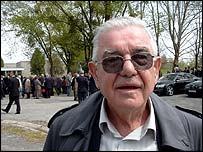Survivors of a World War II death camp have been mourning the victims of Croatia's Nazi puppet regime.
As the BBC's Nick Hawton and Marko Kovac report, war crimes committed long before the atrocities of the 1990s still haunt Croatia as it seeks EU membership.

The atrocities at Jasenovac shocked even the Nazis
|
In the vast open field, on the banks of the Sava River, the survivors came to pay their respects.
Sixty years ago, this was the scene of some of the worst atrocities of World War II.
The Jasenovac death camp came to be known as "the Auschwitz of the Balkans".
Even the Nazis were shocked by what happened here.
Today's survivors glance at the point on the river where so many of their friends and colleagues were brutally murdered.
To their left is the huge concrete monument, shaped into the petals of an opening flower, in honour of the dead.
Some people have tears in their eyes. Many carry flowers. Everyone has their own memories.
"I was arrested because my parents were partisans fighting the fascist regime," says 69-year old Serb Slavko Milanovic.
"My mother had to hide me in bed sheets every morning because Ustasha were separating children and taking them away."
Many of the children were murdered.
Hitler ally
Jasenovac was run by the Croatian Fascist Ustasha allied to Adolf Hitler.
Their victims were Serbs, Jews, Gypsies and Croats opposed the regime.
"There was a brick factory in the camp. It had a big oven that would be heated up and people were thrown in alive." says Slavko.
"They would dig graves, put prisoners in and then hit them with hammers until they died. Concrete was then poured over."
At the commemoration, survivors and their families listen to anniversary speeches by politicians and organisers.
But their minds take them far away from this place - to World War II and those who died as victims of the cruel regime.
No one really knows how many died here. Serbs talk of 700,000. Most estimates put the figure nearer 100,000.
In the post-war communist years, investigations into such crimes were forbidden. The regime did not want to rock the delicate stability of the new Yugoslavia.
"It is very important that we teach our children values that can prevent this catastrophe happening again," says Croatian Prime Minister Ivo Sanader to the hundreds gathered.
"The victory of anti-fascism over fascism is a victory for values which are threaded into modern Europe and modern Croatia."
And it is modern Croatia that is very much on Mr Sanader's mind.
EU accession
This week, Croatia will try to reignite its attempts to join the European Union, at meetings with EU officials in Luxembourg.
In March, accession talks were put on hold because the EU believed modern Croatia was not doing all it could to hand over a general wanted for war crimes during the 1990s.

Simo Klaic spent three years at Jasenovac
|
General Ante Gotovina has been on the run for years. The EU believes Croatia could do more to find him.
But while some people are having trouble resolving modern war crimes, for others it is the old war crimes that prey on their minds.
Croat Simo Klaic, 80, spent three years at Jasenovac in 1942-45.
Today, like every anniversary, he is here to remember his friends who died in the camp.
"This should never, ever happen again - anywhere," he says.
"And let's remember, during the 1940s, there were people who just did not know what the Ustasha were doing here.
"But then there were also those who did know what was being done here - and did nothing," he says.

